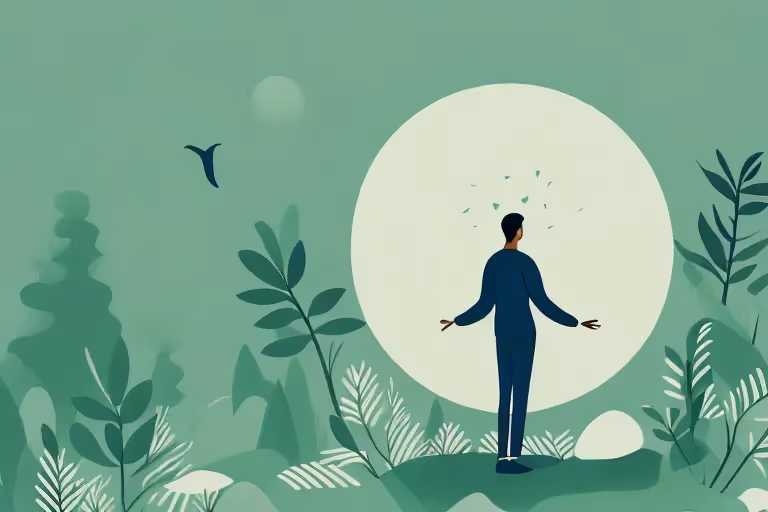Walking meditation, as the name suggests, is a form of meditation in motion. Unlike traditional meditation practices that require stillness and seated posture, walking meditation involves mindful walking, allowing practitioners to cultivate mindfulness and serenity while on the move. This form of meditation is particularly beneficial for those who find it challenging to sit still for extended periods.
Walking meditation is not merely about walking without a purpose or aimlessly wandering. It is about walking with full awareness, paying attention to the movement of the body, the sensation of each step, the rhythm of the breath, and the feeling of the ground beneath the feet. It is about being fully present in the moment, fully engaged with the experience of walking, and fully aware of the surrounding environment.
The Origin and History of Walking Meditation
Walking meditation is a practice rooted in ancient Buddhist traditions. It is known as 'Kinhin' in Zen Buddhism, where it is practiced between long periods of the seated meditation known as 'Zazen'. The purpose of Kinhin is to keep the mind alert and the body active, preventing drowsiness and promoting mindfulness.
Over the centuries, walking meditation has evolved and been adapted by various cultures and spiritual traditions around the world. Today, it is a widely practiced form of meditation, appreciated for its simplicity, accessibility, and the unique blend of physical activity and mindful awareness it offers.
The Practice of Walking Meditation in Buddhism
In Buddhism, walking meditation is considered an essential part of the monastic life. Monks and nuns practice walking meditation daily, often in the early morning hours before sunrise. The practice involves walking slowly and mindfully in a designated meditation path or 'walking meditation hall', focusing on the sensation of each step and the rhythm of the breath.
Walking meditation in Buddhism is not just a physical activity but a spiritual practice. It is seen as a way to cultivate mindfulness, concentration, and insight, key elements in the path to enlightenment. The practice is also used as a method to develop loving-kindness and compassion, essential virtues in Buddhist teachings.
The Benefits of Walking Meditation
Walking meditation offers numerous physical, mental, and spiritual benefits. On a physical level, it promotes better posture, enhances balance and coordination, and provides a gentle form of exercise. It can also help to alleviate physical tension and promote relaxation.

On a mental level, walking meditation can help to reduce stress, anxiety, and depression. It can enhance mental clarity, improve focus and concentration, and promote a sense of peace and well-being. The practice can also foster a deeper connection with nature and the environment, enhancing appreciation and gratitude for the simple act of walking and the beauty of the natural world.
The Role of Walking Meditation in Stress Reduction
Walking meditation is a powerful tool for stress reduction. The combination of mindful walking and focused breathing can help to calm the mind, reduce mental chatter, and promote a state of relaxation. By bringing the attention to the present moment, it helps to break the cycle of negative thinking and worry that often fuels stress and anxiety.
Moreover, walking meditation can help to cultivate resilience to stress. Regular practice can enhance the ability to stay calm and focused in the face of stressors, reducing the impact of stress on physical health and mental well-being. It can also improve sleep quality, a key factor in stress management and overall health.
How to Practice Walking Meditation
Practicing walking meditation is simple and requires no special equipment or location. It can be done anywhere, anytime, whether in a quiet park, a garden, a beach, or even in a busy city street. The key is to walk slowly and mindfully, paying attention to the sensation of each step and the rhythm of the breath.
Begin by standing still and taking a few deep breaths. Feel the ground beneath your feet and the weight of your body. Start walking slowly, focusing on the sensation of lifting and moving each foot, placing it down, and the feeling of the ground beneath. Coordinate your steps with your breath, inhaling as you lift your foot, and exhaling as you place it down.
Walking Meditation Techniques
There are various techniques for practicing walking meditation, each with its unique focus and approach. Some techniques emphasize the sensation of the foot touching the ground, others focus on the movement of the body or the rhythm of the breath. Some techniques involve counting steps, others use a mantra or a gatha (a short verse) to maintain focus.
Regardless of the technique used, the aim is the same: to cultivate mindfulness, to be fully present in the moment, and to engage fully with the experience of walking. It's not about getting somewhere or achieving something, but about being here, now, fully aware and fully alive.
Common Challenges and Tips for Effective Practice
Like any form of meditation, walking meditation can present certain challenges, especially for beginners. Distractions, restlessness, boredom, and physical discomfort are common issues. However, with patience, persistence, and the right approach, these challenges can be overcome.

One of the key tips for effective practice is to start small. Begin with short sessions of 5-10 minutes and gradually increase the duration as your concentration improves. Another tip is to practice regularly, ideally at the same time and place each day. This helps to establish a routine and makes the practice a part of your daily life.
Overcoming Distractions
Distractions are a common challenge in walking meditation. The mind tends to wander, and the surrounding environment can be full of stimuli that draw the attention away. The key to overcoming distractions is not to fight them, but to acknowledge them and gently bring the attention back to the act of walking and the breath.
Remember, the goal of walking meditation is not to empty the mind or to achieve a state of perfect focus, but to cultivate mindfulness, to be fully present in the moment, and to engage fully with the experience of walking. Distractions are not failures, but opportunities to strengthen mindfulness and deepen the practice.
Walking Meditation in Daily Life
Walking meditation is not just a formal practice to be done at a specific time and place. It is a way of life, a way of being in the world. It can be integrated into daily life, turning ordinary walks into opportunities for mindfulness and serenity.
Whether you are walking to work, walking the dog, or simply walking for pleasure, you can practice walking meditation. All it takes is a shift in attention, a decision to be fully present, and a commitment to engage fully with the experience of walking. It's not about adding something extra to your day, but about transforming the ordinary into the extraordinary, the mundane into the mindful.
The Impact of Walking Meditation on Lifestyle
Practicing walking meditation can have a profound impact on your lifestyle. It can help to cultivate a more mindful and serene way of being, reducing stress and enhancing well-being. It can foster a deeper connection with nature and the environment, enhancing appreciation and gratitude for the simple things in life.
Moreover, walking meditation can serve as a gateway to other forms of mindfulness practice. It can enhance your ability to be mindful in other activities, from eating to working to interacting with others. In this way, walking meditation can contribute to a holistic approach to mindfulness, enhancing every aspect of your life.
Conclusion
Walking meditation is a simple yet powerful practice that combines physical activity with mindful awareness. It offers numerous benefits, from stress reduction to improved focus to enhanced well-being. It is a practice that is accessible to all, regardless of age, fitness level, or spiritual belief.
Whether you are new to meditation or an experienced practitioner, walking meditation can be a valuable addition to your mindfulness practice. It is a practice that invites you to slow down, to be fully present, and to engage fully with the simple act of walking. It is a practice that reminds you of the beauty and wonder of the present moment, the joy of being alive, and the serenity that comes from simply being here, now.



.webp)






.avif)

%20(1).avif)


.avif)
.avif)
.webp)


.avif)


















































































































.avif)

















.svg)









